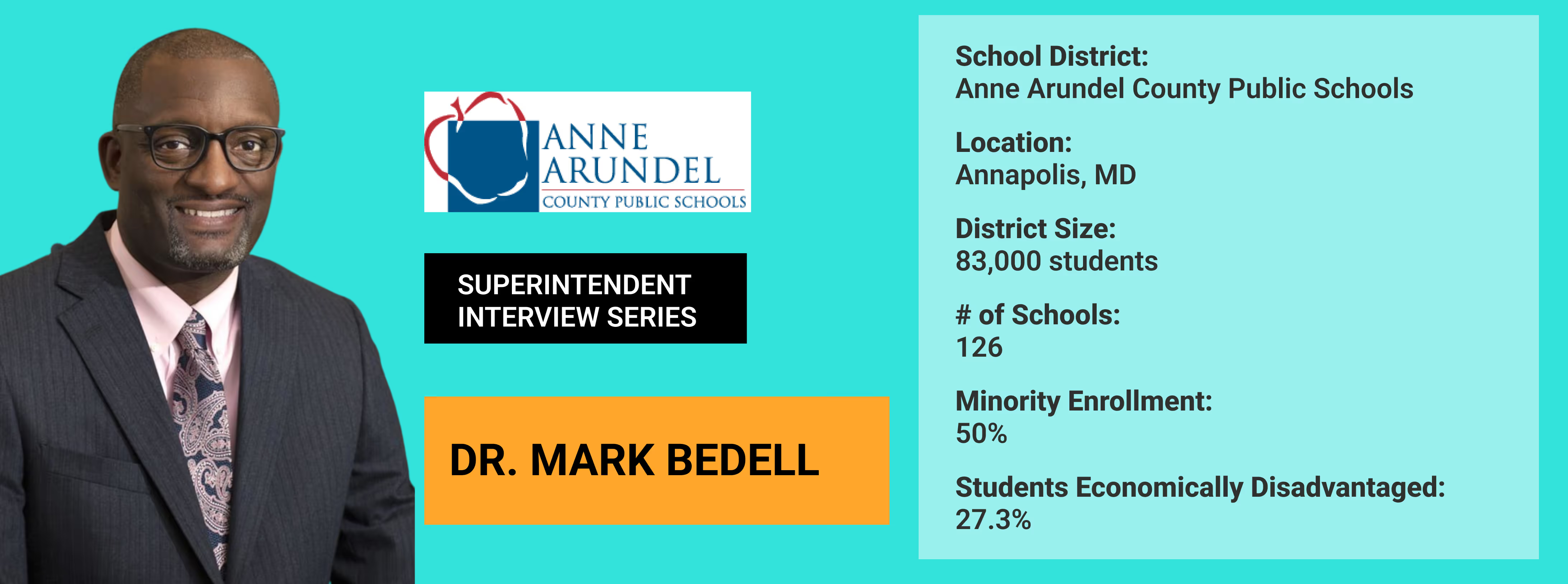Achieving Greatness Through Equity: A conversation with Anne Arundel County Public Schools Superintendent Dr. Mark Bedell
For this special edition of our Superintendent Interview Series, Daybreak’s Director of Partnerships and K-12 District Consultant and former Chief of Student Support at Boston Public Schools, Jillian Kelton, spoke with several Superintendents at the annual Superintendent Collaborative meeting held on June 26-28, 2024. These interviews cover topics and trends affecting these Superintendent’s school communities such as student mental health, chronic absenteeism, academic outcomes, and more. Our goal is to capture different voices and perspectives on the challenges facing our schools today.

Dr. Mark Bedell is halfway through a four-year term as Superintendent of Anne Arundel County Public Schools (AACPS), Maryland’s fourth largest school district with 83,000 students across 126 schools. A career spent pushing for educational equality has earned him many accolades, including being named the 2023 Joseph E. Hill Superintendent of the Year by the National Alliance of Black School Educators. Before Maryland, Dr. Bedell spent six years as Superintendent of Kansas City Public Schools, which he returned to full accreditation status for the first time in more than 20 years.
In his first years at Anne Arundel, he has overhauled the school’s transportation system to reduce absenteeism, widened access to advanced placement courses and successfully bargained for an 8% pay increase across the staff body. “Morale is really off the charts right now,” Dr. Bedell says, and he’s nowhere near done. In this interview, we speak to the Superintendent about navigating political agendas and community opposition to put student needs first.
“Regardless of How You Show Up, You Belong”
Anne Arundel County Schools are good schools, Dr. Bedell says, but under his watch “good” does not mean “good enough.” His plans for greatness, particularly in the social emotional learning space, have the full support of the board. Senior staff – from cabinet members to the chief of staff – are so invested they drive across the county to mentor students. And those students are showing up to class in greater numbers, which translates to fewer dollars lost for the district. At the end of February 2024, the percentage of chronically absent students was 21.2%, a 3.6% improvement on the previous year.
Convincing the “this is how we've always done it” crowd is a different story. “I'm already receiving a lot of pushback on some moves that I'm making, but these are the right moves and this is what's going to allow our district to become a phenomenal school district,” Dr. Bedell says.
The county’s 2024–2029 strategic plan is built on the principles of belonging, equity and innovation, with the social and emotional wellbeing of staff and students a key priority. Some members of the community disagree with that approach, which Dr. Bedell says is influenced by a resistance to change.
“In Anne Arundel County, we are a very perfect school district. So people don't want to talk about equity, they don't want to talk about social and emotional learning. They don't want unity lessons. The reality is, Anne Arundel County is changing. This is not the Anne Arundel County of 10 years ago. Regardless of how you show up, you belong.”
Fostering Inclusivity
As part of AACPS’ Project Unity program, schools hold four Unity Days each year, where students participate in lessons on social justice around the themes of identity, diversity, justice and action. These lessons are intended to foster inclusiveness and reduce bullying. But not everyone sees it that way.
“Now, what people will say is this social and emotional learning is just a disguise for trying to indoctrinate children. And I've had to say in a public board meeting, ‘we're not here to indoctrinate anybody’,” says Dr. Bedell of the program, which predates his appointment as Superintendent.
“We have a responsibility – from a social and emotional development standpoint – to help our people, help our students understand that just because somebody doesn't live a lifestyle that they believe they should live, or don't look like them, or have different sexual orientation or religious beliefs, doesn't make them bad people,” Dr. Bedell says.
“Whether you're from a conservative family, whether you're from a liberal family, whether you're moderate, in our school district, our lessons are going to embrace the wholeness of everybody who shows up.”
Making Mental Health a Priority
This year, Dr. Bedell appointed the district’s first Chief Student & Systemic Supports Officer to oversee SEL programs, as well as on-campus student support services such as social workers, psychologists and counselors. This new hire is also responsible for safety and security, he says, “because if you do not feel that there's a sense of safety and security in your schools, that ultimately will impact the mental wellbeing of people in that building – students and adults.”
A key part of the new support officer role will involve working with the Anne Arundel County Health Department to ensure that schools are accessing every available resource. Applying for grants is also a priority, and one which is already paying off: AACPS was recently awarded a $300,000 grant from the US Department of Education to recruit diverse staff members and interns in the areas of school counseling, school psychology and school social work over the next four years.
The next step, he says, is breaking down the stigma of mental health care in the country, especially among the Black community. “I think as a leader, I have a responsibility to insert my vulnerability to say to them that even as a Superintendent, I get therapy. I go and I get support and there's nothing wrong with that.”
It is this refreshing honesty, coupled with a fearless commitment to doing right by every child in the Anne Arundel Public School system, that sets Dr. Bedell apart among leaders.
Downloadable Content
The State of Youth Mental Health & Our Schools
How schools are responding to the rising demand for student mental health services.
.svg)
.png)